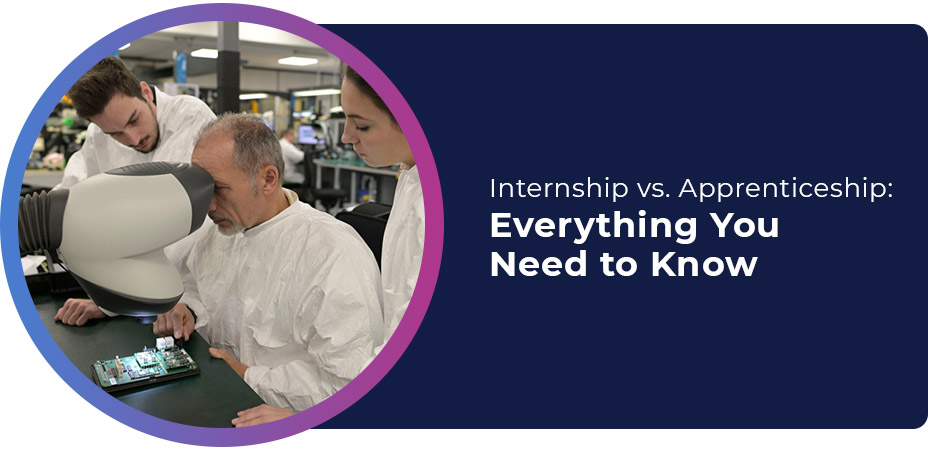So, what are you going to major in? If you’re about to graduate from high school, you’re probably getting this question a lot. Although it’s an innocent thing to ask, this question automatically assumes that you’re going to college—because what else is there, right?
Actually, there are many different career paths that can lead to a fulfilling career, some of which don’t involve getting a four-year degree. Today, we’re going to explore one such career path: vocational school.
From dental hygienists and registered nurses to electricians and aircraft technicians, some of the best trade school jobs can be snagged by completing a vocational program. But what is vocational school, and is it the right career path for you? Tallo is here to help you find out.
A Trade School or Career School
A vocational school, also called a trade school or career school, is a form of education that is designed to teach students the valuable skills they need to perform a particular task or job. These schools usually provide practical training that focuses on a single field.
Ok, so how is this any different than college? The main difference between trade school vs. college comes down to the type of training. College provides an academic training, while vocational school focuses exclusively on highly technical skills that help prepare students for a specific trade.
Here are a few more defining characteristics of vocational schools:
- Provide hands-on, practical learning
- Offer accelerated learning programs (less than two years)
- May require apprenticeships to further their knowledge
- May require prior certification or credentials
Why Consider Vocational School?
Vocational school is a great way to gain job-ready skills that prepare you for a fulfilling career. Here are some reasons why a high school graduate might choose vocational school over a traditional college education:
- Less time commitment: Getting a bachelor’s degree from a traditional college will take you about four years—and that’s if you graduate on time. Many students (at least 40 percent) fail to graduate within this window. With vocational school, you’re looking at two years of schooling, which is far more doable.
- Lower cost: Tuition, housing, books, fees—the costs associated with a four-year degree can add up quickly. Combined with the fact that wages have barely increased over the last few decades, it’s no wonder that young professionals are considering vocational school as an alternative to college.
- Smaller class sizes: Forget about lecture halls with hundreds of students. Vocational schools usually have much smaller class sizes that don’t make you feel like a little fish in a big pond. With fewer students in class, instructors can provide one-on-one training that results in better learning and opportunities.
- Gain in-demand skills: The world desperately needs nurses, electricians, welders, air traffic controllers, and other in-demand occupations. Vocational schools focus on teaching job-ready skills that will prepare you to hit the ground running (and make a killing while you’re at it).
- No general education courses: Raise your hand if you hated home economics, speech, and other seemingly pointless classes. If you raised your hand, rejoice! There are little to no general education classes in vocational school. They’ll teach you strictly what you need to know without tacking on extra requirements.
Top Vocational School Careers
The right vocational school program can give you more than a steady job and income. It can also give you a fulfilling career. If you’re not sure what to do with your life just yet, here are some of the more popular vocational school career paths that are worth considering.
Source: The U.S. Bureau of Labor Statistics
- Dental Assistant ($40,080): Dental assistants help the dentist perform a variety of treatments, including taking radiographs, doing routine cleanings, and taking impressions of the patient’s teeth.
- Veterinary Assistant ($28,590): Veterinary assistants perform routine pet care and hold animals during examinations. One huge perk? Seeing cute animals all the time (literally us, though).
- Pharmacy Technician ($33,950): As a pharmacy technician, you’ll help pharmacists dispense prescription medications to customers and relay patient needs to the pharmacists.
- Paralegal ($51,740): Also known as legal assistants, paralegals work under lawyers and handle a wide range of legal tasks. You’ll prepare affidavits, organize case files, assist attorneys during trials, and maybe conduct client interviews.
- Chef ($51,530): Want to become the next Gordon Ramsay? A culinary vocational school will give you the skills you need to start working in a commercial kitchen.
- Electrician ($56,180): If you want an in-demand career, look into getting an electrician apprenticeship. Electricians are tasked with installing, repairing, and maintaining electrical and power systems. In other words, they aren’t going away any time soon.
- Cosmetologist ($26,270): Love doing hair and makeup? Cosmetologists are skilled in styling hair, doing makeup, painting nails, and other beauty-related tasks.
Planning Your Career Path
If you’re not sure what to do after high school, try not to stress. There are plenty of career paths you can take, one of which is vocational school. With the right vocational program and plenty of hard work, you can gain the skills you need to achieve career success.
Are you pursuing vocational school? Tell the Community about your experience and what trade you’re going for.







